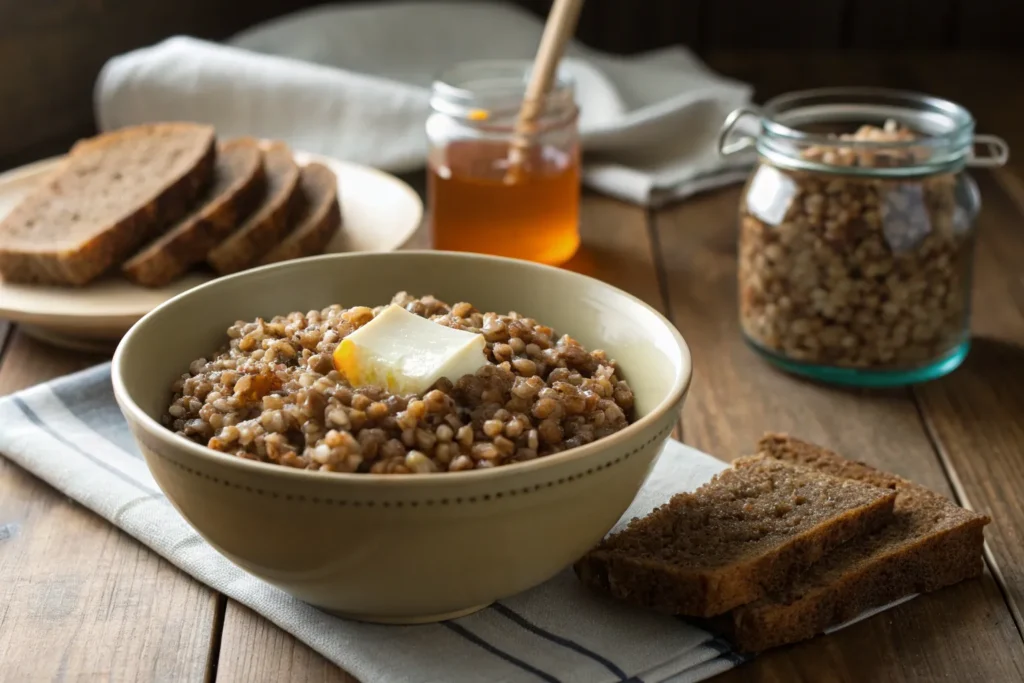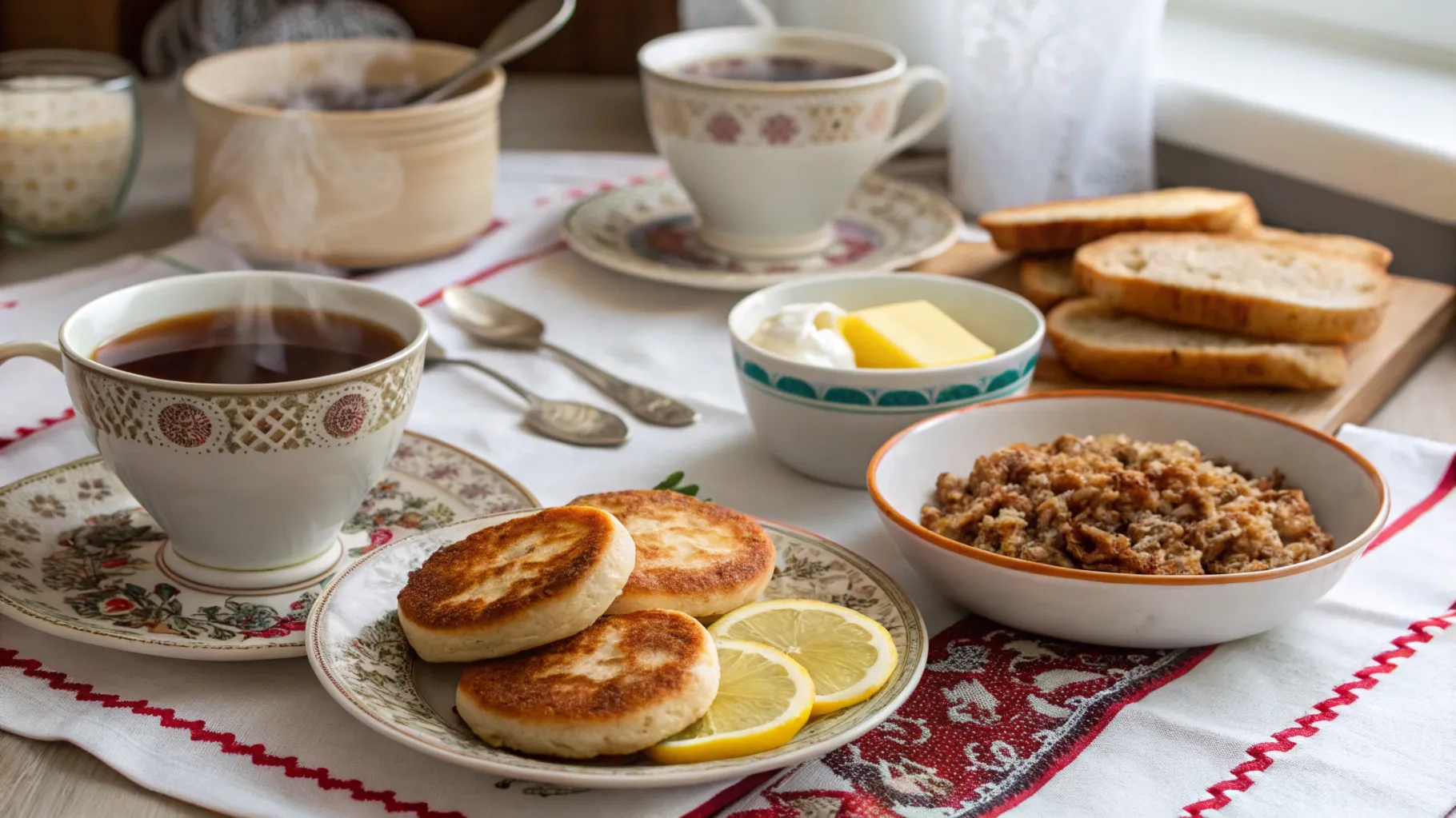Russian breakfasts are more than just meals; they’re a delightful exploration of tradition, culture, and flavors. Packed with hearty ingredients and unique dishes, they reflect the essence of Russian culinary heritage. This article takes you on a journey through traditional Russian breakfast foods, exploring their cultural significance, popular recipes, and regional variations. Whether you’re a food enthusiast or just curious, you’ll uncover the fascinating world of Russian breakfast step by step.
Table of contents
What is a Traditional Russian Breakfast?
The Importance of Breakfast in Russian Culture
Breakfast is considered the foundation of a productive day in Russia. Unlike quick, on-the-go meals popular in some cultures, Russian breakfasts are hearty and satisfying, designed to provide energy for the often harsh climate. The emphasis is on comforting, warm foods that nourish both body and soul.
Traditionally, the Russian breakfast table is a gathering place for families to connect before the day begins. Whether in urban settings or rural homes, breakfast remains a cherished ritual, combining simplicity with rich flavors.
Staple Ingredients of a Russian Breakfast
Bread, Dairy, and Grains
Bread plays a central role in the Russian breakfast, often served with butter, cheese, or jam. From rye to wheat, bread varieties are as diverse as they are delicious. Dairy products like sour cream (smetana), cottage cheese, and milk also feature prominently.
Grains, especially kasha (porridge), are another cornerstone. Made from buckwheat, oats, or semolina, kasha is often sweetened with honey or dried fruits, making it a versatile and wholesome dish.
Traditional Beverages Like Tea and Kvass
No Russian breakfast is complete without a steaming cup of tea. Black tea, often served with lemon, is a breakfast staple, offering warmth and comfort. For a more traditional twist, kvass—a mildly fermented drink made from rye bread—is sometimes included. These beverages not only complement the meal but also highlight the deep-rooted traditions of Russian tea culture.
Popular Dishes Found on a Russian Breakfast Table
Porridges: Kasha Variants and Their Cultural Significance
Porridge, or kasha, is the quintessential Russian breakfast dish. This warm and hearty staple comes in many forms, made with grains like buckwheat, millet, and semolina. Buckwheat kasha is particularly popular for its nutty flavor and nutritional benefits. Often sweetened with honey, fruits, or jam, or served savory with butter and salt, kasha reflects the versatility of Russian breakfast traditions.
Russian households cherish kasha for its simplicity and historical roots. It’s deeply ingrained in Slavic culture, symbolizing sustenance and comfort during long winters. Many recipes passed through generations remain unchanged, making kasha a nostalgic dish for many.
Blini: Russian Pancakes with Sweet and Savory Toppings
Blini, thin Russian pancakes, hold a special place on the breakfast table. These crepe-like delights are typically made with wheat or buckwheat flour and served with a variety of toppings. From sweet fillings like condensed milk, honey, or jam to savory options like smoked salmon and sour cream (smetana), blini offer something for everyone.
Blini are also deeply symbolic in Russian culture, often associated with holidays like Maslenitsa (Butter Week), a celebration of winter’s end. Their round shape symbolizes the sun, making them a fitting start to the day.
Syrniki: The Perfect Cheese Pancakes
Another popular choice for a Russian breakfast is syrniki, soft and fluffy cheese pancakes made with farmer’s cheese. These golden-brown pancakes are typically sweetened with sugar and served with sour cream, honey, or berry preserves. Their rich flavor and creamy texture make syrniki a beloved comfort food.

Syrniki are often considered a treat due to their indulgent taste, yet they’re surprisingly simple to make. Combining high-protein cheese with minimal ingredients, they provide a nutrient-packed start to the day.
How Russian Breakfast Differs from Other Cultures
Comparison with Western Breakfast Traditions
A typical Russian breakfast contrasts sharply with Western breakfasts, which often include quick cereals, pastries, or eggs and bacon. Russians prioritize hearty, homemade meals that provide lasting energy. Unlike sugary cereals or grab-and-go items, traditional dishes like kasha or blini are designed to sustain individuals through physically demanding days.
Furthermore, breakfast beverages differ significantly. While coffee dominates Western tables, Russians are more likely to enjoy a robust cup of black tea with lemon or milk. This choice reflects the cultural emphasis on tea as a communal and calming experience.
Similarities and Unique Elements in Slavic Breakfasts
Russian breakfasts share similarities with other Slavic cultures, such as the use of grains and dairy. However, Russia’s vast geography adds unique regional touches. For example, in northern areas, breakfasts may feature preserved fish or hearty rye bread, while southern regions lean towards fresh vegetables and lighter fare.
Despite shared elements, Russian breakfasts stand out for their diversity and cultural depth. The symbolic role of dishes like blini and the widespread love for tea highlight the country’s distinct culinary identity.
Easy Russian Breakfast Recipes to Try at Home
Step-by-Step Recipe for Making Syrniki
Syrniki, or Russian cheese pancakes, are a must-try for anyone exploring Russian breakfast. They’re quick, simple, and full of flavor. Here’s an easy recipe to recreate this classic dish at home:
Ingredients:
- 2 cups of farmer’s cheese or cottage cheese (well-drained)
- 2 eggs
- 3 tablespoons of sugar (adjust to taste)
- ½ teaspoon of vanilla extract
- ½ cup of flour (plus extra for dusting)
- Oil or butter for frying
Instructions:
- In a bowl, mix the cheese, eggs, sugar, and vanilla until smooth. Gradually add flour until the mixture forms a sticky dough.
- Dust a work surface with flour, and shape the dough into small patties about ½-inch thick.
- Heat oil or butter in a skillet over medium heat. Fry the patties until golden brown on each side, about 2-3 minutes per side.
- Serve warm with sour cream, honey, or fruit preserves.
These fluffy delights pair perfectly with tea, offering an authentic taste of a traditional Russian breakfast.
Quick Guide to Preparing Kasha
Another cornerstone of Russian breakfast is kasha, a nutritious and versatile porridge. Buckwheat kasha is particularly popular and incredibly easy to prepare.

Ingredients:
- 1 cup of buckwheat groats
- 2 cups of water or milk
- A pinch of salt and sugar (optional)
- Butter for serving
Instructions:
- Rinse the buckwheat groats under cold water to remove debris.
- In a pot, bring water or milk to a boil. Add the groats and salt. Reduce heat to low, cover, and simmer for about 15 minutes or until the liquid is absorbed.
- Stir in butter for a creamy finish. Add a sprinkle of sugar or honey for sweetness if desired.
For more ideas, check out our other breakfast recipes here.
FAQs About Russian Breakfast
What is the typical breakfast in Russia?
A typical Russian breakfast often features hearty, homemade dishes such as porridge (kasha), blini, or syrniki. Bread served with butter or cheese is also common, alongside a cup of black tea.
What is a traditional breakfast in Russian households?
Traditional breakfasts focus on simple, wholesome ingredients. Kasha made with buckwheat or oats is a favorite, often paired with dairy products like sour cream or cottage cheese. These dishes are easy to prepare yet deeply satisfying.
What is usually served for breakfast in Russia?
Breakfast in Russia typically includes warm, comforting meals designed to fuel the day. Popular choices include syrniki, blini, and bread with jams or butter. Porridge, a versatile staple, is often sweetened with honey or enriched with milk.
What is the most popular Russian breakfast dish?
Syrniki often takes the crown as the most beloved Russian breakfast dish. Its soft, creamy texture and sweet flavor make it a crowd-pleaser. It’s frequently served with sour cream and a drizzle of honey or jam.
Russian Breakfast Through History: A Glimpse into the Past
Traditional Breakfast in the Soviet Era
During the Soviet era, breakfast was shaped by practicality and availability. The meals were designed to be filling, affordable, and easy to prepare. Staples like kasha and black bread dominated the Russian breakfast table, often paired with tea or a small portion of cheese or jam. Milk and dairy products like sour cream were also popular, though sometimes rationed.
In cities, people relied on simple porridges or eggs when available, while rural households often included fresh produce or homemade bread. Despite limitations, breakfast remained an essential start to the day, reflecting the resilience and resourcefulness of Russian families.
Influence of Modern Trends on Russian Breakfasts
As the country opened up to global influences, the concept of breakfast began to evolve. Today, urban households may include more Western-inspired options like cereals, pastries, or sandwiches. However, traditional dishes like blini, syrniki, and kasha still hold a cherished place.
Modern Russian breakfasts often blend tradition with convenience. For example, syrniki might now be paired with trendy toppings like Greek yogurt or fresh berries. Similarly, beverages have diversified to include coffee alongside the ever-popular black tea. This balance between heritage and modernity ensures the enduring appeal of the Russian breakfast.
Regional Variations in Russian Breakfast
Breakfast Staples in Urban vs. Rural Russia
In urban areas, breakfasts tend to be quicker and more diverse, reflecting the fast-paced lifestyle of city dwellers. Options like sandwiches, cereals, or even yogurt bowls are common for those on the go. However, traditional elements like tea and bread still persist.
Rural breakfasts, on the other hand, remain deeply tied to tradition. Homemade kasha, fresh milk, and baked goods feature prominently, often accompanied by produce from home gardens. These meals emphasize heartiness and local flavors, showcasing the essence of a Russian breakfast.
Unique Breakfast Dishes in Russian Republics
Russia’s vast geography gives rise to unique regional breakfast dishes. In the Caucasus region, you might find flatbreads paired with tangy cheeses or fermented milk products like kefir. Meanwhile, in Siberia, preserved fish or hearty rye-based dishes are more common.
Regional breakfasts also reflect the multicultural influences within Russia. For instance, Tatarstan offers chak-chak, a sweet fried dough, while the Far East incorporates ingredients like seaweed or salmon. These variations highlight the diversity within the overarching tradition of the Russian breakfast.
Tips for Incorporating Russian Breakfast into Your Routine
Making it Affordable and Accessible
Incorporating a Russian breakfast into your daily routine doesn’t have to break the bank. Many traditional ingredients like buckwheat, cottage cheese, and eggs are inexpensive and widely available. Start by experimenting with simple dishes like kasha or syrniki, which require only a handful of ingredients but pack a lot of flavor and nutrition.
For a quick and budget-friendly option, try pairing rye bread with butter or jam, accompanied by a hot cup of black tea. These staples provide a taste of Russian tradition without requiring complex preparation.
Blending Russian Breakfast with Your Existing Diet
Adding elements of a Russian breakfast to your existing diet is easier than you think. Consider swapping your usual oatmeal for buckwheat kasha or adding syrniki as a weekend treat. If you prefer savory breakfasts, blini with sour cream or smoked salmon can offer a delightful twist.
By gradually integrating these hearty and wholesome dishes, you’ll enjoy a richer, more satisfying start to your day.
Conclusion: Embracing the Tradition of Russian Breakfast
A Russian breakfast is more than just a meal—it’s a celebration of tradition, simplicity, and nourishment. From the comforting warmth of kasha to the delicate sweetness of syrniki and the cultural significance of blini, each dish tells a story of heritage and resilience. Whether you’re exploring these flavors for the first time or looking to bring a piece of Russian culture into your daily life, there’s something deeply satisfying about these wholesome and versatile meals.
By incorporating these traditional elements into your routine, you not only enrich your breakfast table but also connect with a rich culinary history that has stood the test of time. So, why not take a sip of tea, enjoy a hearty dish of kasha, and start your day the Russian way? It’s a delicious journey worth taking.

Syrniki and Kasha
Ingredients
Method
- In a bowl, mix the cheese, eggs, sugar, and vanilla until smooth.
- Gradually add flour until the mixture forms a sticky dough.
- Dust a work surface with flour, and shape the dough into small patties about ½-inch thick.
- Heat oil or butter in a skillet over medium heat. Fry the patties until golden brown on each side, about 2-3 minutes per side.
- Serve warm with sour cream, honey, or fruit preserves.
- Rinse the buckwheat groats under cold water to remove debris.
- In a pot, bring water or milk to a boil. Add the groats and salt. Reduce heat to low, cover, and simmer for about 15 minutes or until the liquid is absorbed.
- Stir in butter for a creamy finish. Add a sprinkle of sugar or honey for sweetness if desired.

